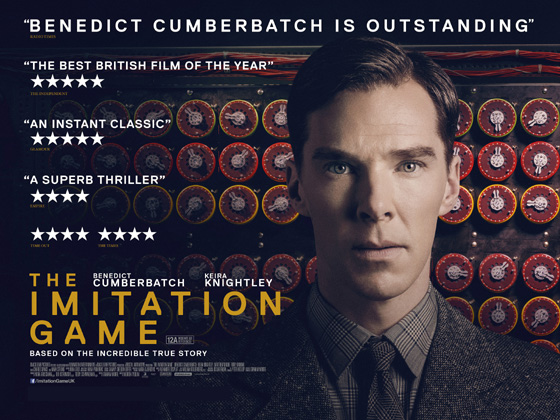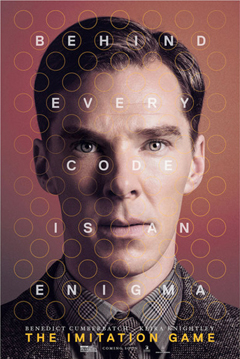The Film
The Imitation Game is a 2014 historical thriller film directed by Morten Tyldum, with a screenplay by Graham Moore based on the biography 'Alan Turing: The Enigma' by Andrew Hodges. It stars Benedict Cumberbatch as the British cryptanalyst Alan Turing, who helped solve the Enigma code during the Second World War.
The film's screenplay topped the annual Black List for best unproduced Hollywood scripts in 2011. The Weinstein Company acquired the film for $7 million in February 2014, the highest amount ever paid for U.S. distribution rights at the European Film Market. It was released theatrically in the United Kingdom on 14 November 2014 and the U.S. on 28 November 2014.
The Imitation Game was a commercial and critical success. By March 2015, it had grossed over $212 million worldwide against a $14 million production budget, making it the highest-grossing independent film of 2014. It was nominated in eight categories at the 87th Academy Awards, including Best Picture, Best Director (Tyldum), Best Actor (Cumberbatch), and Best Supporting Actress (Keira Knightley). It won an Academy Award for Best Adapted Screenplay. It received five nominations in the 72nd Golden Globe Awards, and was nominated in three categories at the 21st Screen Actors Guild Awards, including Outstanding Performance by a Cast in a Motion Picture. It also received nine British Academy of Film and Television Arts (BAFTA) nominations, including Best Film and Outstanding British Film.
Cinema Trailer

Development Before Cumberbatch joined the project, Warner Bros. bought the screenplay for a reported seven-figure sum because of Leonardo DiCaprio's interest in playing Turing. In the end, DiCaprio did not come on board and the rights of the script reverted to the screenwriter. Black Bear Pictures subsequently committed to finance the film for $14 million. Various directors were attached during development including Ron Howard and David Yates. In December 2012, it was announced that Headhunters director Morten Tyldum would helm the project, making the film his English-language directorial debut. Principal photography began on 15 September 2013 in England. Filming locations included Turing's former school, Sherborne, and Bletchley Park, where Turing and his colleagues worked during the war. Other locations included towns in England such as Nettlebed (Joyce Grove in Oxfordshire) and Chesham (Buckinghamshire). Scenes were also filmed at Bicester Airfield and outside the Law Society Building in Chancery Lane. Principal photography finished on 11 November 2013. The bombe seen in the film is based on a replica of Turing's original machine, which is housed in the museum at Bletchley Park. Production designer Maria Djurkovic admitted, however, that her team made the machine more cinematic by making it larger and having more of its inside mechanisms visible. The Weinstein Company acquired the film for $7 million in February 2014, the highest amount ever paid for US distribution rights at the European Film Market. The film is also a recipient of Tribeca Film Festival's Sloan Filmmaker Fund, which grants filmmakers funding and guidance with regard to innovative films that are concerned with science, mathematics and technology. Title The film's title refers to Turing's proposed test of the same name, which he discussed in his 1950 paper on artificial intelligence entitled "Computing Machinery and Intelligence". The paper opens: "I propose to consider the question, 'Can machines think?' This should begin with definitions of the meaning of the terms 'machine' and 'think'."
|
|
| Cast
Benedict Cumberbatch as Alan Turing Music In June 2014 it was announced that Alexandre Desplat would provide the original score of the film. Desplat composed and orchestrated the score in under three weeks.It was recorded by the London Symphony Orchestra at Abbey Road Studios in London. Desplat explained the complexity of continuity and structure in writing a score: "...when the camera at the end of the film has those beautiful shots of the young boy, the young Alan, and he’s meeting with the professor who’s telling him his friend Christopher is dead, and the camera is pushing in on him, I play Christopher’s theme that we heard very early on in the film. There’s a simple continuity there. It’s the accumulation of these moments that I can slowly but surely play that make it even stronger." He uses continuous piano arpeggios to represent both Turing's thinking mind and the workings of a mechanical machine. The score received an Academy Award nomination for Best Original Score, losing to the score of The Grand Budapest Hotel, also composed by Desplat. Original
Motion Picture Soundtrack Album |
